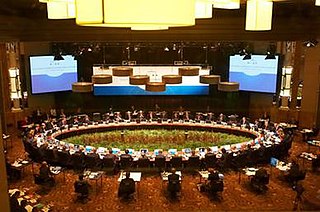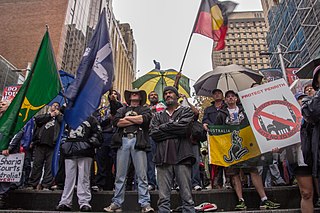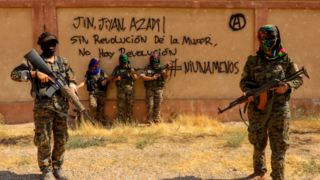Related Research Articles

The Independent Media Center is an open publishing network of activist journalist collectives that report on political and social issues. Beginnings were made in London and Sydney during the 1999 Carnival Against Capital then the first Indymedia Media Center was founded to report on the protests against the World Trade Organisational Ministerial Conference in Seattle. Indymedia became closely associated with the global justice movement, which criticized neo-liberalism and its associated institutions.

The Asia-Pacific Economic Cooperation is an inter-governmental forum for 21 member economies in the Pacific Rim that promotes free trade throughout the Asia-Pacific region. Following the success of ASEAN's series of post-ministerial conferences launched in the mid-1980s, APEC started in 1989, in response to the growing interdependence of Asia-Pacific economies and the advent of regional trade blocs in other parts of the world; it aimed to establish new markets for agricultural products and raw materials beyond Europe. Headquartered in Singapore, APEC is recognized as one of the highest-level multilateral blocs and oldest forums in the Asia-Pacific region, and exerts a significant global influence.

A black bloc is a tactic used by protesters who wear black clothing, ski masks, scarves, sunglasses, motorcycle helmets with padding, or other face-concealing and face-protecting items. The clothing is used to conceal wearers' identities and hinder criminal prosecution by making it difficult to distinguish between participants. It is also used to protect their faces and eyes from pepper spray, which is used by police during protests or civil unrest. The tactic allows the group to appear as one large unified mass. Black bloc participants are often associated with anarchism, anarcho-communism, communism, libertarian socialism or the anti-globalization movement.
Anarcho-pacifism, also referred to as anarchist pacifism and pacifist anarchism, is an anarchist school of thought that advocates for the use of peaceful, non-violent forms of resistance in the struggle for social change. Anarcho-pacifism rejects the principle of violence which is seen as a form of power and therefore as contradictory to key anarchist ideals such as the rejection of hierarchy and dominance. Many anarcho-pacifists are also Christian anarchists, who reject war and the use of violence.

The 1999 Seattle WTO protests, sometimes referred to as the Battle of Seattle, were a series of protests surrounding the WTO Ministerial Conference of 1999, when members of the World Trade Organization (WTO) convened at the Washington State Convention and Trade Center in Seattle, Washington on November 30, 1999. The Conference was to be the launch of a new millennial round of trade negotiations.

Socialist Alternative (SA) is a Trotskyist organisation in Australia. As a revolutionary socialist group, it describes itself as aiming to organise collective struggles against oppression and inequality, while promoting the need for a revolutionary movement that could one day overthrow capitalism. Its members have been involved in organising numerous protest campaigns around issues such as LGBT rights, climate change, racism and refugee rights. The organisation also intervenes into the trade union and student union movements. It has branches and student clubs in most major Australian cities, and publishes the fortnightly newspaper Red Flag.
Anarchism in the United States began in the mid-19th century and started to grow in influence as it entered the American labor movements, growing an anarcho-communist current as well as gaining notoriety for violent propaganda of the deed and campaigning for diverse social reforms in the early 20th century. By around the start of the 20th century, the heyday of individualist anarchism had passed and anarcho-communism and other social anarchist currents emerged as the dominant anarchist tendency.
The Carnival Against Capital took place on Friday 18 June 1999. It was an international day of protest timed to coincide with the 25th G8 summit in Cologne, Germany. The carnival was inspired by the 1980s Stop the City protests, Peoples' Global Action and the Global Street Party, which happened at the same time as the 1998 24th G8 Summit in Birmingham. The rallying slogan was Our Resistance is as Transnational as Capital.

A political demonstration is an action by a mass group or collection of groups of people in favor of a political or other cause or people partaking in a protest against a cause of concern; it often consists of walking in a mass march formation and either beginning with or meeting at a designated endpoint, or rally, to hear speakers. It is different from mass meeting.

Abahlali baseMjondolo is a shack dwellers' movement in South Africa which campaigns both against evictions and for public housing. The movement grew out of a road blockade organised from the Kennedy Road shack settlement in the city of Durban. As of June 2021 it claims to have "more than 100 000 members in 86 branches across five provinces".

The 2006 G-20 Meeting of Finance Ministers and Central Bank Governors was held in Melbourne between 18 and 19 November 2006. Issues discussed included "the outlook for the global economy; developments in resource markets and ways to improve their efficiency; the impact of demographic change on global financial markets; and further reform of the International Monetary Fund and the World Bank."

Anarchism in Australia arrived within a few years of anarchism developing as a distinct tendency in the wake of the 1871 Paris Commune. Although a minor school of thought and politics, composed primarily of campaigners and intellectuals, Australian anarchism has formed a significant current throughout the history and literature of the colonies and nation. Anarchism's influence has been industrial and cultural, though its influence has waned from its high point in the early 20th century where anarchist techniques and ideas deeply influenced the official Australian union movement. In the mid 20th century anarchism's influence was primarily restricted to urban bohemian cultural movements. In the late 20th century and early 21st century Australian anarchism has been an element in Australia's social justice and protest movements.

APEC Australia 2007 was a series of political meetings held around Australia between the 21 member economies of the Asia-Pacific Economic Cooperation during 2007. Various meetings were held across Australia from January to August 2007, with the event cumulating in Leaders Week, where the heads of government of each member economy attended Sydney, New South Wales from 2 to 9 September 2007.

Reclaim Australia is a far-right Australian nationalist protest group which is associated with nationalist and neo-Nazi hate groups. The group was formed in 2015, holding street rallies in cities across Australia to protest against Islam. It has protested in Sydney, Melbourne, Brisbane, Adelaide, Newcastle and Canberra. Reclaim Australia has also been described as a loose collective of groups.

Peter James McGregor was an Australian Anarchist known for his political activism, University teaching and commitment to direct action. He was actively involved and often led the major Australian and international political campaigns of the last 40 years.

Stop the War Coalition (StWC) is an Australian anti-war group initially formed in Sydney in 2003 in response to the US-led wars in Iraq and Afghanistan and the general "War on Terror" of which the Australian Government has been a strong ally.
The political philosophy of anarchism has had a small presence in New Zealand politics.

Operations Support Group (OSG) police are specialist police within the New South Wales Police Force. They are trained in public order (riot) response; weaponless control ; violent prisoner cell extractions; high-value asset protection; navigation and terrain search; bomb searching; and chemical, biological and radiation (CBR) response.

Direct action originated as a political activist term for economic and political acts in which the actors use their power to directly reach certain goals of interest; in contrast to those actions that appeal to others ; by, for example, revealing an existing problem, using physical violence, highlighting an alternative, or demonstrating a possible solution.

Insurrectionary anarchism is a revolutionary theory and tendency within the anarchist movement that emphasizes insurrection as a revolutionary practice. It is critical of formal organizations such as labor unions and federations that are based on a political programme and periodic congresses. Instead, insurrectionary anarchists advocate informal organization and small affinity group based organization. Insurrectionary anarchists put value in attack, permanent class conflict and a refusal to negotiate or compromise with class enemies.
References
- 1 2 Police hunt for violent G20 protesters ABC PM radio transcript - Monday, 20 November 2006. Accessed 13 September 2007
- 1 2 Anarchist training manual 'justifies' APEC security ABC Online 3 September 2007. Accessed 12 September 2007
- ↑ Write National Young Writers Festival Program 2007 Archived 29 August 2007 at the Wayback Machine Young Writers Festival website, Accessed 12 September 2007
- ↑ News Briefs - Halliburton Subsidiary Protested Archived 3 August 2012 at archive.today Green Left Weekly, 8 September 2004. Accessed 13 September 2007
- ↑ G20 Actions, Friday Morning Archived 24 May 2007 at the Wayback Machine Melbourne Indymedia Friday 17 November 2006 at 12:40 PM
- ↑ (en) g20 protests lead up by the mutiny collective, Ainfos news service Fri, 17 November 2006 Accessed 13 September 2007
- ↑ Sydney Social Forum schedule Sydney Social Forum, September 2004. Accessed 13 September 2007
- ↑ A Space Outside Workshop Program November 2006. Accessed 13 September 2007
- ↑ Aided and Raided: Australian Imperialism in the Pacific forum, April 2007. Accessed 13 September 2007
- ↑ Mutiny - A Paper of Anarchist Ideas and Actions Archived 17 October 2007 at the Wayback Machine Mutiny Website. Accessed 12 September 2007
- ↑ (en) Australia, Sydney, An open letter from Mutiny* to people thinking about organising protests at APEC Archived 8 June 2011 at the Wayback Machine Ainfos, Sun, 6 May 2007. Accessed Sept 12, 2007
- ↑ An open letter from Mutiny Sydney Indymedia, 7 May 2007. Accessed 13 September 2007
- ↑ Anarchists ready for APEC violence Archived 16 September 2007 at the Wayback Machine National Nine News, Shaun Davies, Ninemsn 4 June 2007. Accessed 16 September 2007
- ↑ APEC Meeting (Police Powers) Bill 2007 - Second Reading Archived 12 October 2007 at the Wayback Machine Hansard 26 June 2007. Accessed 12 September 2007
- ↑ What tactics for the Stop Bush protest at APEC? Archived 13 July 2009 at the Wayback Machine GreenLeft Weekly, Simon Cunich, 11 May 2007. Accessed 13 September 2007
- ↑ Dateline Feature:REINING IN THE PARADE Archived 13 September 2007 at the Wayback Machine SBS News 5 September 2007. Accessed 15 September 2007
- ↑ Five more activists added to blacklist Alexandra Smith, Jordan Baker, and Edmund Tadros, Sydney Morning Herald, 5 September 2007. Accessed 15 September 2007
- ↑ F.L.A.R.E. in the void website Accessed 12 September 2007. F.L.A.R.E. is the acronym for For Liberation, Autonomy, Resistance, Exodus
- ↑ Hildebrand, Joe; Farr, Malcolm (3 September 2007). "'Rioters' plot to target Bush". The Daily Telegraph. Archived from the original on 5 February 2008. Retrieved 12 September 2007.
- ↑ Protesters can't rule out violent action Edmund Tadros and Phillip Coorey, Sydney Morning Herald, 4 September 2007. Accessed 16 September 2007
- ↑ Nigel Hunt, 'Ferals' put end to Remembrance Day show , Daily Telegraph, 7 September 2008. Accessed 11 September 2008